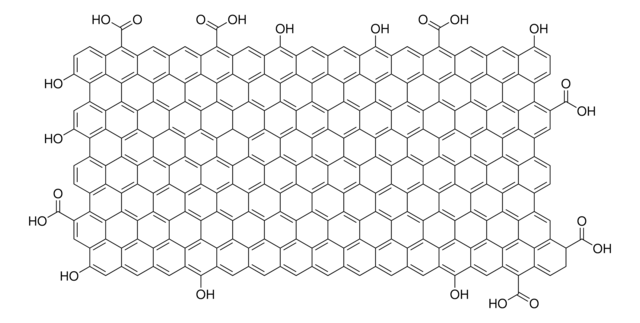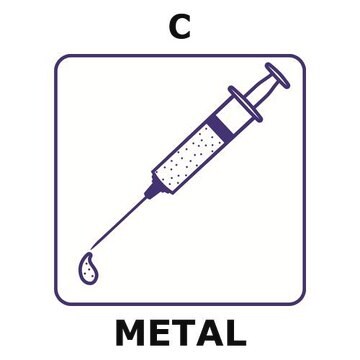Recommended Products
description
0.12-0.15 Ω-cm (as 3D-printed fibers, not ink, 200-400 μm diameter)
form
viscous liquid
greener alternative product characteristics
Design for Energy Efficiency
Learn more about the Principles of Green Chemistry.
sustainability
Greener Alternative Product
particle size
1-15 nm (thick)
1-20 μm (length and width)
viscosity
20-60 Pa.s
bp
39 °C
density
1.5-1.8 g/mL at 25 °C
greener alternative category
, Enabling
storage temp.
2-8°C
General description
Application
- Direct syringe extrusion into solid fibers or structures-can be extruded by hand, or by machine, from any standard syringe.
- Dip-coating.
- Spin-coating.
- Casting.
- Fusing-separately produced solid 3D printing graphene objects can be joined via application of additional ink at points of contact.
Signal Word
Danger
Hazard Statements
Precautionary Statements
Hazard Classifications
Aquatic Chronic 3 - Carc. 2 - Eye Irrit. 2 - Repr. 1B - Skin Irrit. 2 - STOT SE 3
Target Organs
Central nervous system
Storage Class Code
6.1C - Combustible acute toxic Cat.3 / toxic compounds or compounds which causing chronic effects
WGK
WGK 3
Flash Point(F)
Not applicable
Flash Point(C)
Not applicable
Choose from one of the most recent versions:
Certificates of Analysis (COA)
Don't see the Right Version?
If you require a particular version, you can look up a specific certificate by the Lot or Batch number.
Already Own This Product?
Find documentation for the products that you have recently purchased in the Document Library.
Customers Also Viewed
Articles
Bioinks selection guide for 3D bioprinting of cells for tissues engineering applications.
Since its discovery little more than a decade ago,1 the two-dimensional (2D) allotrope of carbon—graphene—has been the subject of intense multidisciplinary research efforts.
Synthesis and Applications of Graphene Nanoribbons Synthesized
Professor Tokito and Professor Takeda share their new materials, device architecture design principles, and performance optimization protocols for printed and solution-processed, low-cost, highly flexible, organic electronic devices.
Our team of scientists has experience in all areas of research including Life Science, Material Science, Chemical Synthesis, Chromatography, Analytical and many others.
Contact Technical Service


